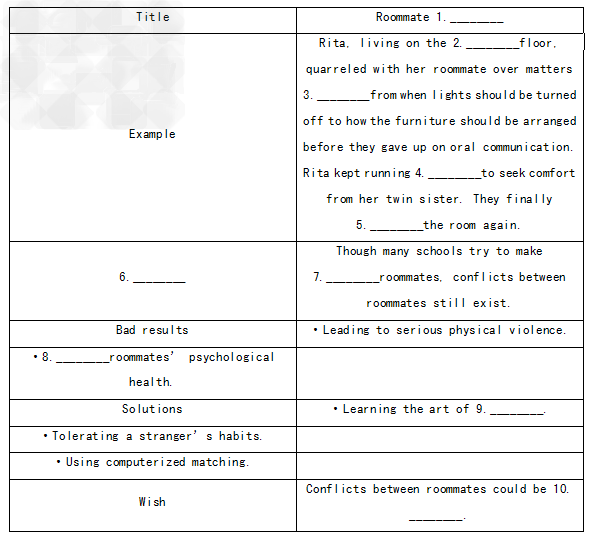任务型读写。
请认真阅读下列短文,并根据所读内容在文章后表格中的空格里填入最恰当的单词.
注意:每个空格只填1 个单词.
Having entered a boarding school, Ada and her twin sister Rita determined to strike out independently. Although the sisters had requested rooms in different buildings, they were placed in the same, Ada on the
eighth floor and Rita one floor higher. While Ada lived in harmony with her roommate, Rita was unhappy. She and her roommate had a quarrel over matters like the smallest thing-the time of lights being turned
off-and the biggest thing-the arrangement of the furniture. Finally, they communicated primarily through
short notes rather than by speaking. Rita kept running down along the stairs to ask Ada for help. Before
long, the two wanted to live together again. Rita's roommate finally had to move out.
Rita's ability to solve her problem by rooming with her twin is unusual, but the conflict she faced is not. Despite great efforts by many schools to make good roommate matches, unpleasant outcomes are
common.
Most conflicts between roommates develop from small, annoying differences. In extreme cases, the
conflicts can lead to serious violence and affect roommates' psychological ( 心理的) health.
Learning to tolerate a stranger's habits may teach students the art of compromise, but the learning process
is often painful.
Many schools have started conflict solution programs to calm tensions that could build up like a volcano preparing to explode, resulting in physical violence.Some schools try to prevent conflicts by using computerized matching. Students are put together on the basis of their answers to housing form questions about
preferred hours of study and sleep, and selfdescribed tendencies toward tidiness or disorder. Parents
sometimes weaken the process by taking the forms and filling in false data about their children's habits.
If only conflicts between roommates could disappear!


